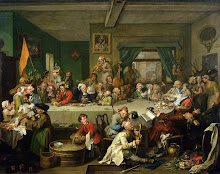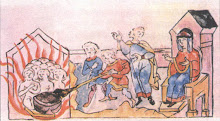Elizabeth Arnold, senior, disappeared from the historical record in May of 1798, and it is presumed she died around that time. In 1802, young Elizabeth married another actor named Charles Hopkins. Her husband died in October of 1805, and five or six months later, she and David Poe Jr. entered into their brief union--a marriage she probably heartily regretted by the time she died on December 8, 1811.
Those are the only facts about Eliza Poe's life that can be stated with any certainty. She was by all accounts a performer possessing beauty and charisma, with a particular talent for comedic and musical roles, but we have little idea of what she was like off the stage. The only personal relic we have of her is a very brief, unimportant, poorly-written note thanking a Mrs. Tazewell "for her great kindness." Her posthumous reputation has always been haunted by allegations that her youngest child Rosalie was illegitimate (according to more than one source, her sister-in-law Maria Clemm asserted that Rosalie was not the child of either David or Eliza,) but we cannot know if there was a firm basis for the legend. Many years later, Mrs. Clemm described Edgar's mother as "a lovely little creature and highly talented. I loved her most devotedly." However, she admitted that the Poe family had violently disapproved of David's marriage, only unbending somewhat when the couple's children were born. Unfortunately, Mrs. Clemm volunteered little other information about a woman she evidently barely knew.
Our main source of personal information about Eliza is Marie Louise Shew Houghton, of all people. She often mentioned Edgar's mother in the long, incoherent, bizarre letters she sent to John H. Ingram in the 1870s, but unfortunately her information is largely uncorroborated and usually unbelievable. (In truth, it is nearly impossible to think of anything she wrote that can be verified.) Mrs. Houghton told Ingram that Edgar had had a bundle of his mother's letters, and two sketches she had made, including one of Boston Harbor that contained the inscription "For my little son Edgar, who should ever love Boston, the place of his birth and where his mother found her best and most sympathetic friends." Houghton claimed that Mrs. Clemm resented any mention of Eliza and disparaged these mementos.
We have no other evidence of any of this. These letters and sketches are not extant, and there is no record of anyone else seeing, or even mentioning, these items, leading one to doubt they ever existed. There is also no other testimony that Mrs. Clemm had any negative attitudes towards Edgar's mother. (It must always be remembered that although Ingram--very inexplicably and irresponsibly--used Mrs. Houghton as a major source for his biography of Poe, he privately admitted that he found her mentally unstable and "imaginative.")
 We can also credit Mrs. Houghton for the well-known miniature painting that we have of Eliza, but even that comes with a decided question mark. Houghton admitted that the portrait had been painted by herself, using as a model a miniature once owned by Edgar. This alleged original portrait, like the other artifacts mentioned by Mrs. Houghton, has never been found, making it impossible to verify if it is an authentic likeness. (Art historian Michael Deas dismissed the Houghton picture as "questionable.")
We can also credit Mrs. Houghton for the well-known miniature painting that we have of Eliza, but even that comes with a decided question mark. Houghton admitted that the portrait had been painted by herself, using as a model a miniature once owned by Edgar. This alleged original portrait, like the other artifacts mentioned by Mrs. Houghton, has never been found, making it impossible to verify if it is an authentic likeness. (Art historian Michael Deas dismissed the Houghton picture as "questionable.")It is unfortunate that we know little about one crucial question involving David and Eliza Poe--their son Edgar's true opinion of them. It can be taken for granted that he keenly felt his orphaned status, but everyone who ever knew him--save the verbose and imaginative Nurse Marie Louise--agreed that he very seldom, if ever, even mentioned his parents. Mrs. Houghton quoted him as declaring that he owed to his mother "every good gift of his intellect, & his heart," and that Eliza was "as pure, as angelic and altogether lovely, as any woman could be on earth." Poe may have uttered words of the sort--even though he evidently had no personal memories of his mother--but, again, we only have Mrs. Houghton's ever-unreliable word for it. (Marie Louise was, let us not forget, the same source who also insisted to Ingram that Richard Henry Stoddard--who we know met Poe on only two very brief and ultimately very unpleasant occasions in 1845--had not only attended Virginia Poe's funeral, but helped her arrange flowers and sprinkle cologne about the house. "With green goggles over his eyes.")
The most revealing remark we have from Poe about his parents comes from a letter he wrote in December of 1835 to Beverley Tucker, a friend of Poe's then-employer Thomas W. White. Tucker had written White a letter mentioning his memories of seeing the beautiful Eliza Poe on stage, a statement which White passed on to Edgar. Poe responded with some of the most touching words he ever wrote, telling Tucker that, "In speaking of my mother you have touched a string to which my heart fully responds. To have known her is to be an object of great interest in my eyes. I myself never knew her--and never knew the affection of a father. Both died (as you may remember) within a few weeks of each other. I have many occasional dealings with Adversity--but the want of parental affection has been the heaviest of my trials."
Ten years later, he wrote in the "Broadway Journal" a spirited defense of the acting profession, concluding that "The writer of this article is himself the son of an actress--has invariably made it his boast--and no earl was ever prouder of his earldom than he of his descent from a woman who, although well born, hesitated not to consecrate to the drama her brief career of genius and of beauty." (We have no idea if his claim that his mother was "well born" came from any genuine information or--much more likely--simply his habitual fondness for fictionalizing his background.)
With David and Eliza Poe, we are faced with the common themes of Edgar's history--rumor, speculation, hearsay, contradiction, and facts that are all too few and far between.















